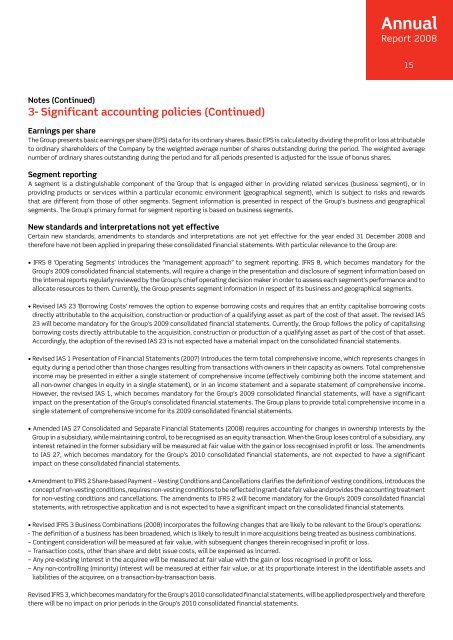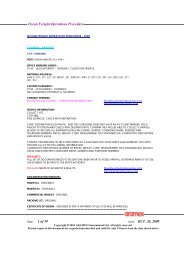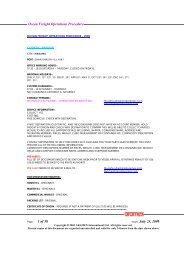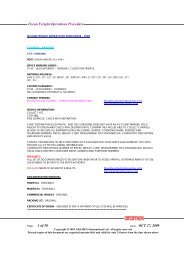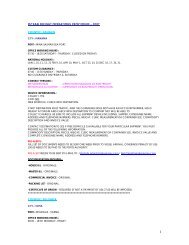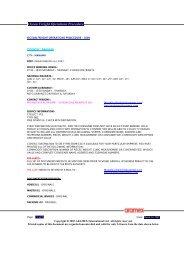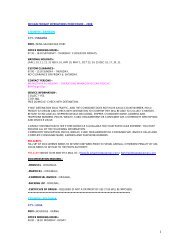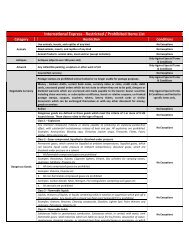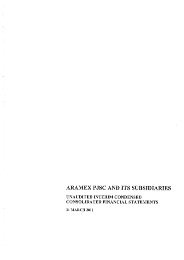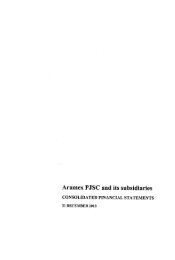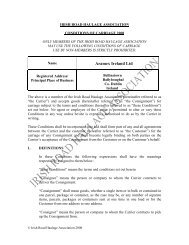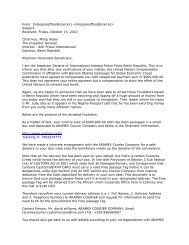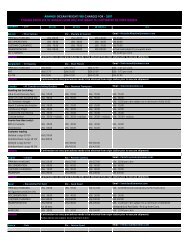Annual - Aramex
Annual - Aramex
Annual - Aramex
Create successful ePaper yourself
Turn your PDF publications into a flip-book with our unique Google optimized e-Paper software.
Notes (Continued)<br />
3- Significant accounting policies (Continued)<br />
<strong>Annual</strong><br />
Report 2008<br />
Earnings per share<br />
The Group presents basic earnings per share (EPS) data for its ordinary shares. Basic EPS is calculated by dividing the profit or loss attributable<br />
to ordinary shareholders of the Company by the weighted average number of shares outstanding during the period. The weighted average<br />
number of ordinary shares outstanding during the period and for all periods presented is adjusted for the issue of bonus shares.<br />
Segment reporting<br />
A segment is a distinguishable component of the Group that is engaged either in providing related services (business segment), or in<br />
providing products or services within a particular economic environment (geographical segment), which is subject to risks and rewards<br />
that are different from those of other segments. Segment information is presented in respect of the Group’s business and geographical<br />
segments. The Group’s primary format for segment reporting is based on business segments.<br />
New standards and interpretations not yet effective<br />
Certain new standards, amendments to standards and interpretations are not yet effective for the year ended 31 December 2008 and<br />
therefore have not been applied in preparing these consolidated financial statements. With particular relevance to the Group are:<br />
• IFRS 8 ‘Operating Segments’ introduces the “management approach” to segment reporting. IFRS 8, which becomes mandatory for the<br />
Group’s 2009 consolidated financial statements, will require a change in the presentation and disclosure of segment information based on<br />
the internal reports regularly reviewed by the Group’s chief operating decision maker in order to assess each segment’s performance and to<br />
allocate resources to them. Currently, the Group presents segment information in respect of its business and geographical segments.<br />
• Revised IAS 23 ‘Borrowing Costs’ removes the option to expense borrowing costs and requires that an entity capitalise borrowing costs<br />
directly attributable to the acquisition, construction or production of a qualifying asset as part of the cost of that asset. The revised IAS<br />
23 will become mandatory for the Group’s 2009 consolidated financial statements. Currently, the Group follows the policy of capitalising<br />
borrowing costs directly attributable to the acquisition, construction or production of a qualifying asset as part of the cost of that asset.<br />
Accordingly, the adoption of the revised IAS 23 is not expected have a material impact on the consolidated financial statements.<br />
• Revised IAS 1 Presentation of Financial Statements (2007) introduces the term total comprehensive income, which represents changes in<br />
equity during a period other than those changes resulting from transactions with owners in their capacity as owners. Total comprehensive<br />
income may be presented in either a single statement of comprehensive income (effectively combining both the income statement and<br />
all non-owner changes in equity in a single statement), or in an income statement and a separate statement of comprehensive income.<br />
However, the revised IAS 1, which becomes mandatory for the Group’s 2009 consolidated financial statements, will have a significant<br />
impact on the presentation of the Group’s consolidated financial statements. The Group plans to provide total comprehensive income in a<br />
single statement of comprehensive income for its 2009 consolidated financial statements.<br />
• Amended IAS 27 Consolidated and Separate Financial Statements (2008) requires accounting for changes in ownership interests by the<br />
Group in a subsidiary, while maintaining control, to be recognised as an equity transaction. When the Group loses control of a subsidiary, any<br />
interest retained in the former subsidiary will be measured at fair value with the gain or loss recognised in profit or loss. The amendments<br />
to IAS 27, which becomes mandatory for the Group’s 2010 consolidated financial statements, are not expected to have a significant<br />
impact on these consolidated financial statements.<br />
• Amendment to IFRS 2 Share-based Payment – Vesting Conditions and Cancellations clarifies the definition of vesting conditions, introduces the<br />
concept of non-vesting conditions, requires non-vesting conditions to be reflected in grant-date fair value and provides the accounting treatment<br />
for non-vesting conditions and cancellations. The amendments to IFRS 2 will become mandatory for the Group’s 2009 consolidated financial<br />
statements, with retrospective application and is not expected to have a significant impact on the consolidated financial statements.<br />
• Revised IFRS 3 Business Combinations (2008) incorporates the following changes that are likely to be relevant to the Group’s operations:<br />
- The definition of a business has been broadened, which is likely to result in more acquisitions being treated as business combinations.<br />
– Contingent consideration will be measured at fair value, with subsequent changes therein recognised in profit or loss.<br />
– Transaction costs, other than share and debt issue costs, will be expensed as incurred.<br />
– Any pre-existing interest in the acquiree will be measured at fair value with the gain or loss recognised in profit or loss.<br />
– Any non-controlling (minority) interest will be measured at either fair value, or at its proportionate interest in the identifiable assets and<br />
liabilities of the acquiree, on a transaction-by-transaction basis.<br />
Revised IFRS 3, which becomes mandatory for the Group’s 2010 consolidated financial statements, will be applied prospectively and therefore<br />
there will be no impact on prior periods in the Group’s 2010 consolidated financial statements.<br />
15


